
Parlophone Original Released
#06. Can't Buy Me Love / You Can't Do That (R 5114)
(Update: 8th. June 2023)

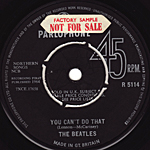 Black Parlophone Label |
|
|
|
TRACK LISTING
|
SIDE 1 | Can't Buy Me Love (Lennon-McCartney) | |||
| SIDE 2 | You Can't Do That (Lennon-McCartney) | ||||
|
RELEASE DATE
|
Factory Sample (First Press: 20th March. 1964) | ||||
| SLEEVE:FRONT | SLEEVE:BACK | SIDE 1 --> Click! | SIDE 2 --> Click! | DISK --> Click! | |
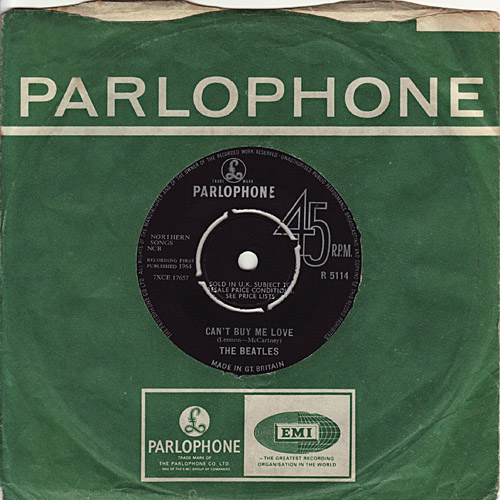 |
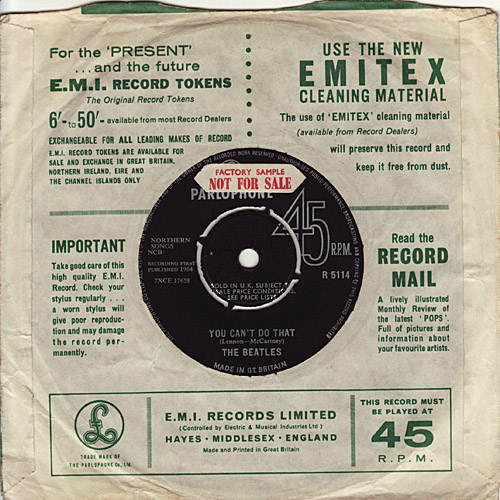 |
 |
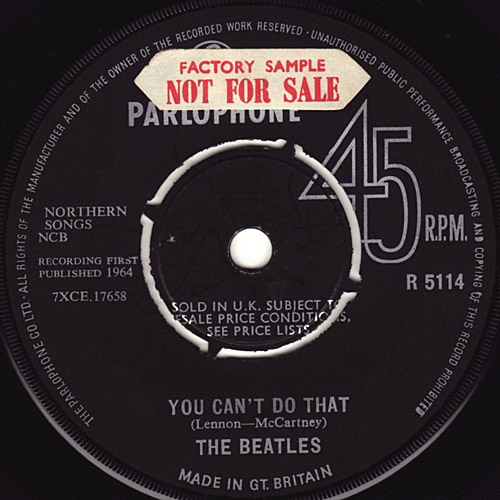 |
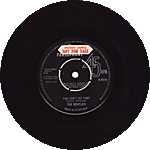 |
|
| LABEL CLOSE UP | |||||
 |
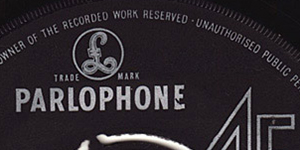 |
The Parlophone logo (small type) was
printed at the top of the label. |
|||
| With a
"FACTORY SAMPLE" sticker on the label of side-2. |
|||||
| LABEL CLOSE UP | |||||
 |
"THE PARLOPHONE CO. LTD. (capital letter)"
was printed at the perimeter. The "RECORDING FIRST PUBLISHED 1964 (capital letter)" statement was printed. |
 |
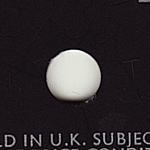 |
" SOLD IN U.K. SUBJECT TO RESALE PRICE CONDITIONS, SEE PRICE LISTS." statement was printed at the center of the label. Push-out center, tax code is "K, T" | |
| LABEL CLOSE UP | |||||
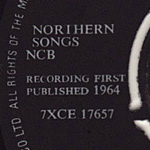 |
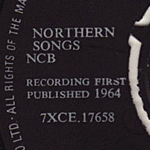 |
PUBLISHER'S CREDIT | SIDE 1 | SIDE 2 | |
| Has the "NORTHERN SONGS NCB (3 lines)"
credits on the label. (NCB to the left of SONGS) |
 |
 |
|||
| Matrix
suffixed with "1N" on both side. |
|||||
| LABEL CLOSE UP | |||||
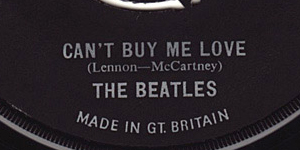 |
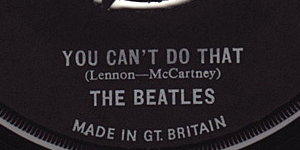 |
Song writer's credit "(Lennon -
McCartney)" is printed in Roman font. The "T" in "MADE IN GT. BRITAIN" text is capital letter. |
|||
|
OTHER ITEM
|
|||||
|
-
|
|||||
|
CATALOG NUMBER
|
R 5114 | ||||
|
LABEL
|
Silver Parlophone (logo: small type) | ||||
|
MIX
|
Mono | ||||
| MATRIX No. | SIDE 1 | 7XCE 17657 - 1N | |||
| SIDE 2 | 7XCE 17658 - 1N | ||||
|
VINYL COLOR
|
BLACK | ||||
|
RECORD COMPANY'S
NAME
|
THE PARLOPHONE CO. LTD. (capital letter) | ||||
|
CENTER
|
Push-out center | ||||
|
CENTRAL REMARK
"SOLD IN U.K..." |
YES | ||||
| RECORDING PUBLISHED CREDIT | RECORDING FIRST PUBLISHED 1964
(capital letter) |
||||
|
PUBLISHER'S NAME
|
SIDE 1
|
NORTHERN SONGS NCB | |||
|
SIDE 2
|
NORTHERN SONGS NCB | ||||
|
PRODUCER
|
George Martin | ||||
|
COVER DESIGN/
PHOTO/ NOTES
|
Green sleeve type-2A :Wavy cut at top. EMI logo was added in rectangular box on front. "TRADE MARK OF THE PARLOPHONE CO LTD." below the Parlophone logo on front. The copies of "Read the RECORD MAIL" were 6 lines. "6'- to 50'-" tokens on back. Glued left and right. |
||||
|
COMMENTS
|
"Can't buy me love (R 5114)" was not pressed as a
demo disc. After the test pressings were approved, and copies were run with the promo labels on them, the printer then loaded the machines with the proper labels for the disk's standard release. Then samples were taken from possibly each press machine making the records, and affixed with a sticker (red ink on white) and checked for quality. Except for the sticker, the disk is exactly as it will be when it is released. Beginning in 1964, Parlophone (and all the other EMI
companies) began printing a phrase in the centers of all
their singles, EP's and LP's, which said: |
||||
|
TRACK LISTING
|
SIDE 1 | Can't Buy Me Love (Lennon-McCartney) | |||
| SIDE 2 | You Can't Do That (Lennon-McCartney) | ||||
|
RELEASE DATE
|
20th March. 1964/First Press | ||||
| SLEEVE:FRONT | SLEEVE:BACK | SIDE 1 --> Click! | SIDE 2 --> Click! | DISK --> Click! | |
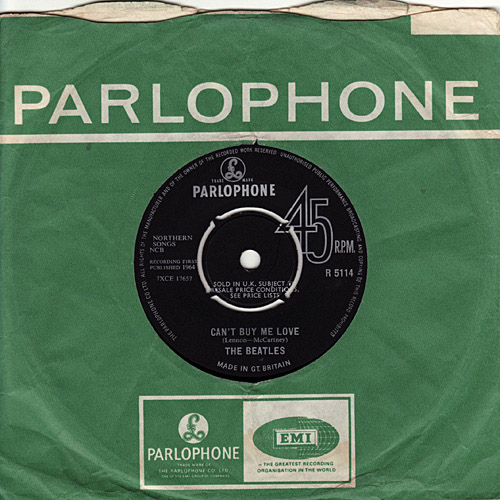 |
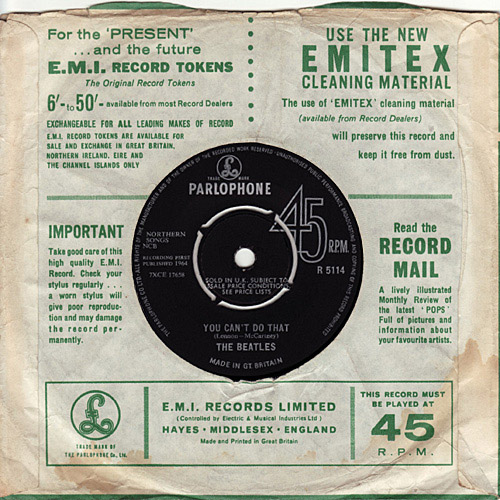 |
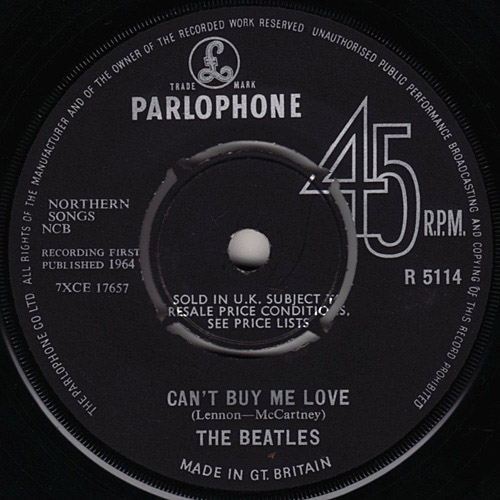 |
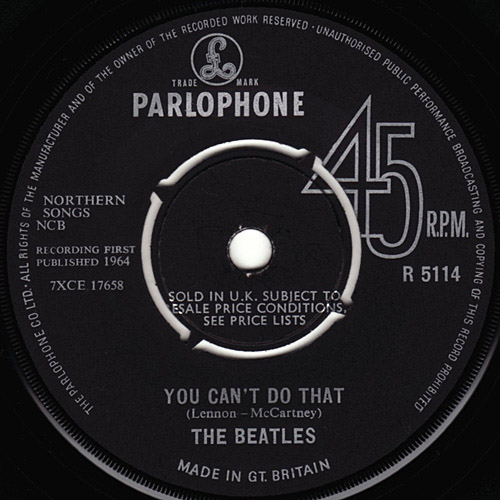 |
 |
|
| LABEL CLOSE UP | |||||
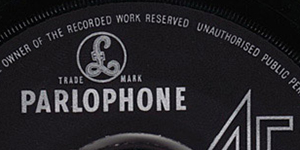 |
The Parlophone logo (small type) was
printed at the top of the label. |
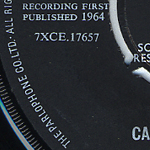 |
"THE PARLOPHONE CO. LTD. (capital letter)"
was printed at the perimeter. The "RECORDING FIRST PUBLISHED 1964 (capital letter)" statement was printed. |
||
| LABEL CLOSE UP | |||||
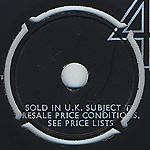 |
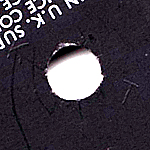 |
Push out
center. " SOLD IN U.K. SUBJECT TO RESALE PRICE CONDITIONS, SEE PRICE LISTS." statement was printed at the center of the label. Tax code is "K, T" |
|||
| LABEL CLOSE UP | |||||
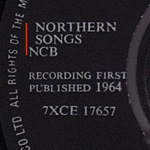 |
Has the "NORTHERN SONGS NCB (3 lines)"
credits on the label. (NCB to the left of SONGS) |
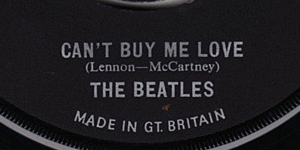 |
Song writer's credit "(Lennon -
McCartney)" is printed in Roman font. The "T" in "MADE IN GT. BRITAIN" text is capital letter. |
||
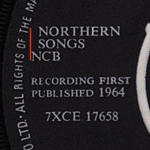 |
Has the "NORTHERN SONGS NCB (3 lines)"
credits on the label. (NCB to the left of SONGS) |
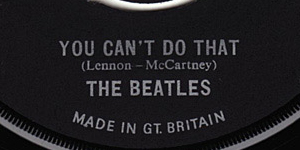 |
Song writer's credit "(Lennon -
McCartney)" is printed in Roman font. The "T" in "MADE IN GT. BRITAIN" text is capital letter. |
||
| LABEL CLOSE UP | |||||
 |
 |
Matrix suffixed with "1N" on both side. | |||
|
OTHER ITEM
|
|||||
|
-
|
|||||
|
CATALOG NUMBER
|
R 5114 | ||||
|
LABEL
|
Silver Parlophone (logo: small type) | ||||
|
MIX
|
Mono | ||||
| MATRIX No. | SIDE 1 | 7XCE 17657 - 1N | |||
| SIDE 2 | 7XCE 17658 - 1N | ||||
|
VINYL COLOR
|
BLACK | ||||
|
RECORD COMPANY'S
NAME
|
THE PARLOPHONE CO. LTD. (capital letter) | ||||
|
CENTER
|
Push-out center | ||||
|
CENTRAL REMARK
"SOLD IN U.K..." |
YES | ||||
| RECORDING PUBLISHED CREDIT | RECORDING FIRST PUBLISHED 1964
(capital letter) |
||||
|
PUBLISHER'S NAME
|
SIDE 1
|
NORTHERN SONGS NCB | |||
|
SIDE 2
|
NORTHERN SONGS NCB | ||||
|
PRODUCER
|
George Martin | ||||
|
COVER DESIGN/
PHOTO/ NOTES
|
Green sleeve type-2A :Wavy cut at top. EMI logo was added in rectangular box on front. "TRADE MARK OF THE PARLOPHONE CO LTD." below the Parlophone logo on front. The copies of "Read the RECORD MAIL" were 6 lines. "6'- to 50'-" tokens on back. Glued left and right. |
||||
|
COMMENTS
|
Beginning in 1964, Parlophone (and all the other EMI
companies) began printing a phrase in the centers of all
their singles, EP's and LP's, which said: |
||||
|
TRACK LISTING
|
SIDE 1 | Can't Buy Me Love (Lennon-McCartney) | |||
| SIDE 2 | You Can't Do That (Lennon-McCartney) | ||||
|
RELEASE DATE
|
1964/Oriole Contract Press | ||||
| SLEEVE:FRONT | SLEEVE:BACK | SIDE 1 --> Click! | SIDE 2 --> Click! | DISK --> Click! | |
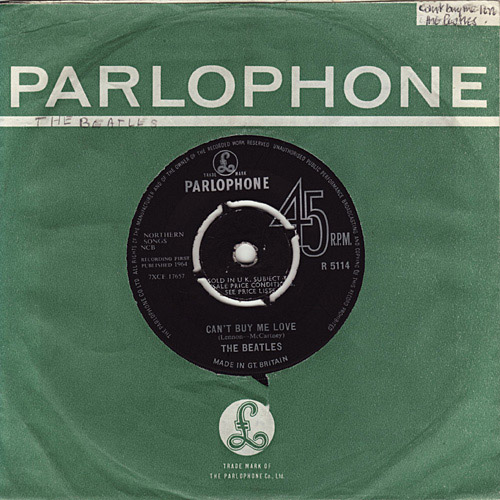 |
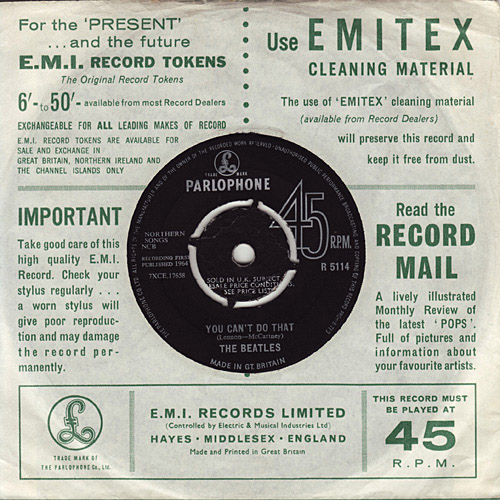 |
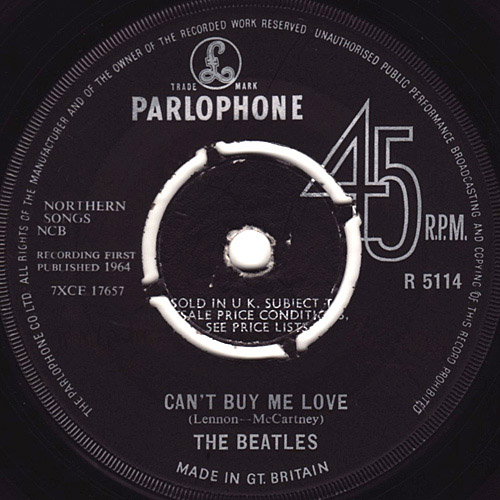 |
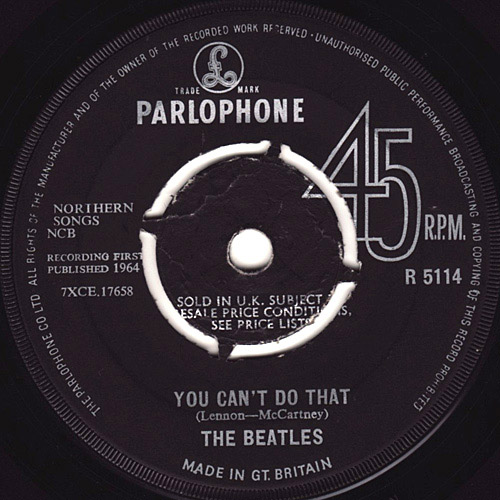 |
 |
|
| LABEL CLOSE UP | |||||
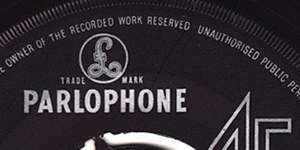 |
The Parlophone logo (small type) was
printed at the top of the label. |
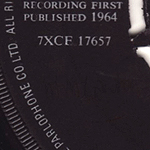 |
"THE PARLOPHONE CO. LTD. (capital letter)" was printed at the perimeter. The "RECORDING FIRST PUBLISHED 1964 (capital letter)" statement was printed. | ||
| LABEL CLOSE UP | |||||
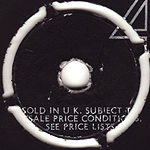 |
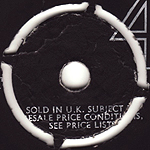 |
Oriole contract pressing, these are
its distinguishing characteristics. (According to "TheBeatlesCollection") 1: No tax code is evident in the push-out center on either side of the disc. 2: The push-out center has a rough texture to it. 3: There is one small ridge that's approximately 0.5mm in from the edge of the push-out center. 4: The gap between the push-out center and the body of the disc is approximately 2.5mm wide. 5: The dinking around the edge of the label is twice the size of the EMI press at 2mm tall. |
|||
| LABEL CLOSE UP | |||||
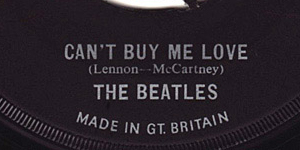 |
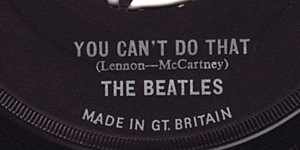 |
Song writer's credit "(Lennon -
McCartney)" is printed in Roman font. The "T" in "MADE IN GT. BRITAIN" text is capital letter. |
|||
| LABEL CLOSE UP | |||||
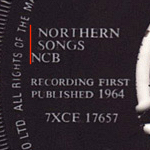 |
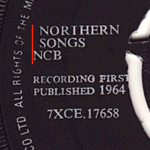 |
PUBLISHER'S CREDIT | SIDE 1 |
SIDE 2 |
|
| Has the "NORTHERN SONGS NCB (3 lines)"
credits on the label. (NCB to the left of SONGS) |
 |
 |
|||
| Matrix suffixed with "1N" on both side. | |||||
|
OTHER ITEM
|
|||||
|
-
|
|||||
|
CATALOG NUMBER
|
R 5114 | ||||
|
LABEL
|
Silver Parlophone (logo: small type) | ||||
|
MIX
|
Mono | ||||
| MATRIX No. | SIDE 1 | 7XCE 17657 - 1N | |||
| SIDE 2 | 7XCE 17658 - 1N | ||||
|
VINYL COLOR
|
BLACK | ||||
|
RECORD COMPANY'S
NAME
|
THE PARLOPHONE CO. LTD. (Capital letter) | ||||
|
CENTER
|
Push-out center: Oriole Contract Pressing | ||||
|
CENTRAL REMARK
"SOLD IN U.K..." |
YES | ||||
| RECORDING PUBLISHED CREDIT | RECORDING FIRST PUBLISHED 1964
(capital letter) |
||||
|
PUBLISHER'S NAME
|
SIDE 1
|
NORTHERN SONGS NCB | |||
|
SIDE 2
|
NORTHERN SONGS NCB | ||||
|
PRODUCER
|
George Martin | ||||
|
COVER DESIGN/
PHOTO/ NOTES
|
Green sleeve type-1A :
Straight cut at top and "6'- to 50'-" on back. Company name is "Electric & Musical Industries Ltd" on the back cover. Inside glued. |
||||
|
COMMENTS
|
Beginning in 1964, Parlophone (and all the other EMI
companies) began printing a phrase in the centers of all
their singles, EP's and LP's, which said: It has been said that EMI had to ask Oriole to press this single. cf. Oriole Records was founded in 1925 by the London-based Levy Company. The original label was discontinued in 1935. David Morris Levy and his brother Jacques revived the Oriole label in 1950. Until 1955 it was the exclusive UK licensee for the American Mercury Records label. Oriole had two record pressing plants, one in Aston Clinton and the other in Colnbrook. Even the "big boys", like Decca and EMI often used Oriolefs pressing facilities when their own had capacity problems. Oriole also produced Embassy Records for Woolworths Limited. Its repertoire consisted of cut-price cover versions of British pop hits. The Oriole Record Company lasted until September 21, 1964, when it was bought, lock, stock and plant, by CBS Inc., who were looking to set up their own manufacturing facility in the UK. The result was CBS Records, and with its coming the Oriole label disappeared forever. |
||||
|
TRACK LISTING
|
SIDE 1 | Can't Buy Me Love (Lennon-McCartney) | |||
| SIDE 2 | You Can't Do That (Lennon-McCartney) | ||||
|
RELEASE DATE
|
1964/Oriole Contract Press | ||||
| SLEEVE:FRONT | SLEEVE:BACK | SIDE 1 --> Click! | SIDE 2 --> Click! | DISK --> Click! | |
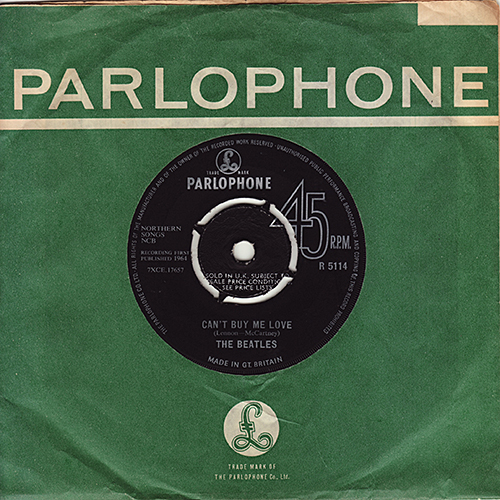 |
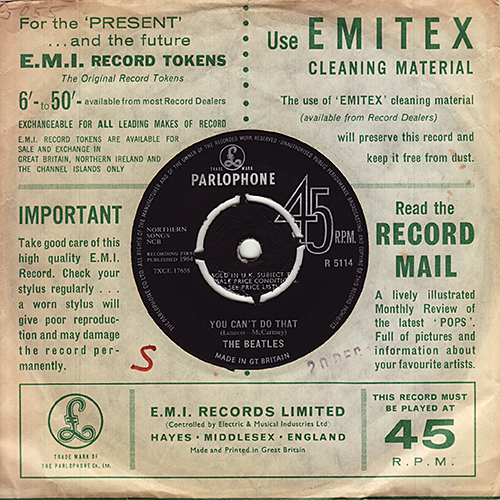 |
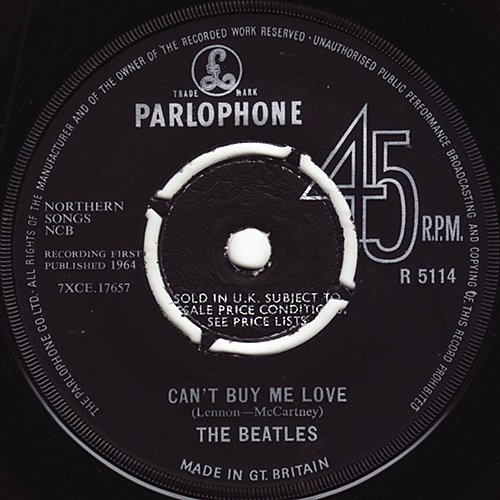 |
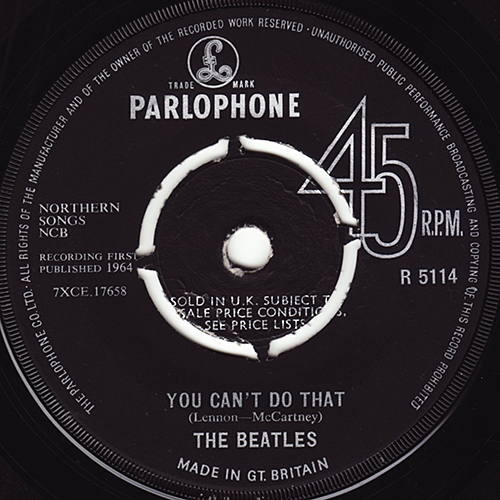 |
 |
|
| LABEL CLOSE UP | |||||
 |
The Parlophone logo (small type) was
printed at the top of the label. |
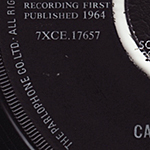 |
"THE PARLOPHONE CO. LTD. (capital letter)" was printed at the perimeter. The "RECORDING FIRST PUBLISHED 1964 (capital letter)" statement was printed. | ||
| LABEL CLOSE UP | |||||
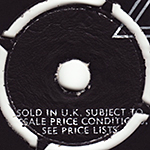 |
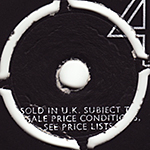 |
Oriole contract pressing, these are
its distinguishing characteristics. (According to "TheBeatlesCollection") 1: No tax code is evident in the push-out center on either side of the disc. 2: The push-out center has a rough texture to it. 3: There is one small ridge that's approximately 0.5mm in from the edge of the push-out center. 4: The gap between the push-out center and the body of the disc is approximately 2.5mm wide. 5: The dinking around the edge of the label is twice the size of the EMI press at 2mm tall. |
|||
| LABEL CLOSE UP | |||||
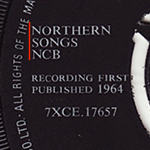 |
Has the "NORTHERN SONGS NCB (3 lines)"
credits on the label. (NCB justified with SONGS) |
 |
Song writer's credit "(Lennon -
McCartney)" is printed in Roman font. The "T" in "MADE IN GT. BRITAIN" text is capital letter. |
||
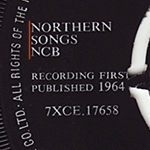 |
Has the "NORTHERN SONGS NCB (3 lines)"
credits on the label. (NCB justified with SONGS) |
 |
Song writer's credit "(Lennon -
McCartney)" is printed in Roman font. The "T" in "MADE IN GT. BRITAIN" text is capital letter. |
||
| #6-4 | #6-3 | LABEL CLOSE UP | MATRIX NUMBER |
||
 |
 |
#6-4 is slightly different layout than #6-3. |  |
Matrix suffixed with "1N" on both side. | |
|
OTHER ITEM
|
|||||
|
-
|
|||||
|
CATALOG NUMBER
|
R 5114 | ||||
|
LABEL
|
Silver Parlophone (logo: small type) | ||||
|
MIX
|
Mono | ||||
| MATRIX No. | SIDE 1 | 7XCE 17657 - 1N | |||
| SIDE 2 | 7XCE 17658 - 1N | ||||
|
VINYL COLOR
|
BLACK | ||||
|
RECORD COMPANY'S
NAME
|
THE PARLOPHONE CO. LTD. (Capital letter) | ||||
|
CENTER
|
Push-out center: Oriole Contract Pressing | ||||
|
CENTRAL REMARK
"SOLD IN U.K..." |
YES | ||||
| RECORDING PUBLISHED CREDIT | RECORDING FIRST PUBLISHED 1964
(capital letter) |
||||
|
PUBLISHER'S NAME
|
SIDE 1
|
NORTHERN SONGS NCB | |||
|
SIDE 2
|
NORTHERN SONGS NCB | ||||
|
PRODUCER
|
George Martin | ||||
|
COVER DESIGN/
PHOTO/ NOTES
|
Green sleeve type-1A :
Straight cut at top and "6'- to 50'-" on back. Company name is "Electric & Musical Industries Ltd" on the back cover. Inside glued. |
||||
|
COMMENTS
|
Beginning in 1964, Parlophone (and all the other EMI
companies) began printing a phrase in the centers of all
their singles, EP's and LP's, which said: It has been said that EMI had to ask Oriole to press this single. cf. Oriole Records was founded in 1925 by the London-based Levy Company. The original label was discontinued in 1935. David Morris Levy and his brother Jacques revived the Oriole label in 1950. Until 1955 it was the exclusive UK licensee for the American Mercury Records label. Oriole had two record pressing plants, one in Aston Clinton and the other in Colnbrook. Even the "big boys", like Decca and EMI often used Oriolefs pressing facilities when their own had capacity problems. Oriole also produced Embassy Records for Woolworths Limited. Its repertoire consisted of cut-price cover versions of British pop hits. The Oriole Record Company lasted until September 21, 1964, when it was bought, lock, stock and plant, by CBS Inc., who were looking to set up their own manufacturing facility in the UK. The result was CBS Records, and with its coming the Oriole label disappeared forever. |
||||
|
TRACK LISTING
|
SIDE 1 | Can't Buy Me Love (Lennon-McCartney) | |||
| SIDE 2 | You Can't Do That (Lennon-McCartney) | ||||
|
RELEASE DATE
|
1964/Pye or Oriole Contract Press? | ||||
| SLEEVE:FRONT | SLEEVE:BACK | SIDE 1 --> Click! | SIDE 2 --> Click! | DISK --> Click! | |
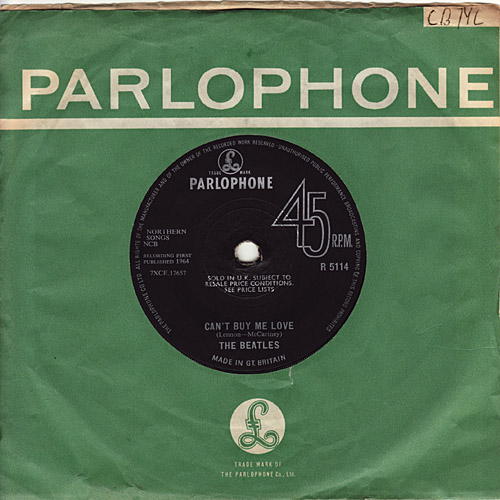 |
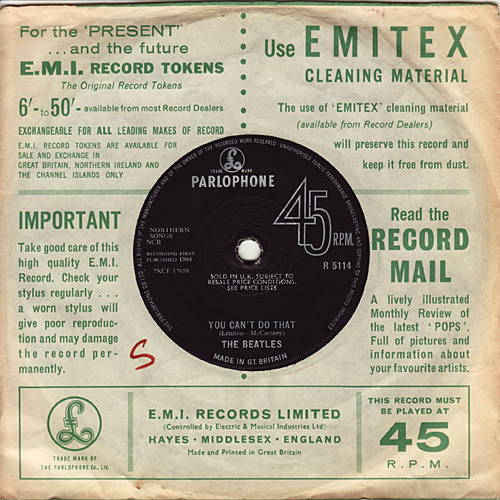 |
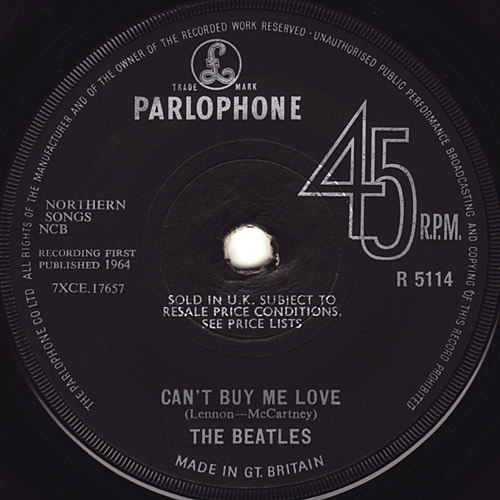 |
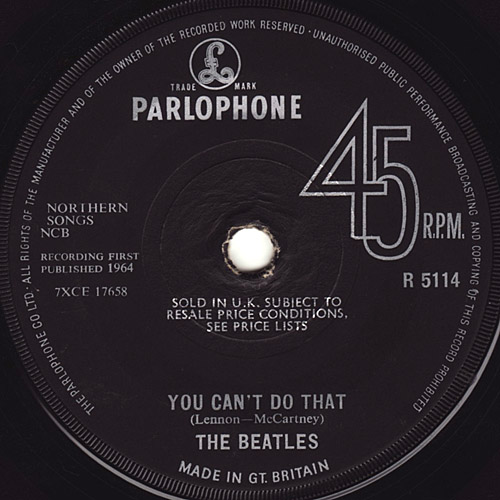 |
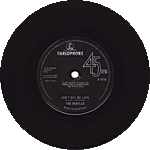 |
|
| LABEL CLOSE UP | |||||
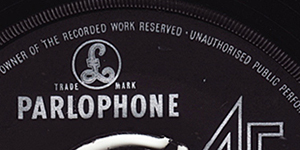 |
The Parlophone logo (small type) was
printed at the top of the label. |
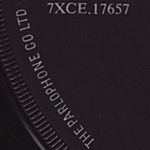 |
"THE PARLOPHONE CO. LTD. (capital letter)" was printed at the perimeter. The "RECORDING FIRST PUBLISHING 1964" statement was printed. | ||
| LABEL CLOSE UP | |||||
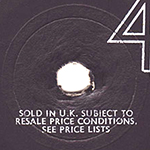 |
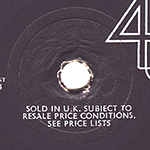 |
Oriole Contract Pressing: (According to "select45rpm.com") Thicker vinyl with a knife edge and often a rough textured label. Oriole generally were all made with push out centres though a small minority with solid centres exist around 1962 for some reason. |
|||
| LABEL CLOSE UP | |||||
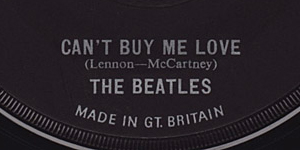 |
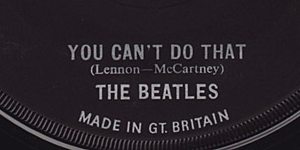 |
Song writer's credit "(Lennon -
McCartney)" is printed in Roman font. The "T" in "MADE IN GT. BRITAIN" text is capital letter. |
|||
| LABEL CLOSE UP | |||||
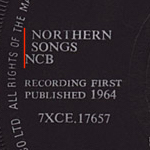 |
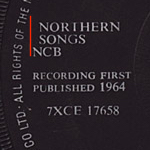 |
PUBLISHER'S CREDIT | SIDE 1 |
SIDE 2 |
|
| Has the "NORTHERN SONGS NCB (3
lines)" credits on the label. (NCB to the left of SONGS) |
 |
 |
|||
| Matrix suffixed with "1N" on both side. | |||||
|
OTHER ITEM
|
|||||
|
-
|
|||||
|
CATALOG NUMBER
|
R 5114 | ||||
|
LABEL
|
Silver Parlophone (logo: small type) | ||||
|
MIX
|
Mono | ||||
| MATRIX No. | SIDE 1 | 7XCE 17657 - 1N | |||
| SIDE 2 | 7XCE 17658 - 1N | ||||
|
VINYL COLOR
|
BLACK | ||||
|
RECORD COMPANY'S
NAME
|
THE PARLOPHONE CO. LTD. (Capital letter) | ||||
|
CENTER
|
Solid center: Oriole Contract Pressing | ||||
|
CENTRAL REMARK
"SOLD IN U.K..." |
YES | ||||
| RECORDING PUBLISHED CREDIT | RECORDING FIRST PUBLISHED 1964
(capital letter) |
||||
|
PUBLISHER'S NAME
|
SIDE 1
|
NORTHERN SONGS NCB | |||
|
SIDE 2
|
NORTHERN SONGS NCB | ||||
|
PRODUCER
|
George Martin | ||||
|
COVER DESIGN/
PHOTO/ NOTES
|
Green sleeve type-1A :
Straight cut at top and "6'- to 50'-" on back. Company name is "Electric & Musical Industries Ltd" on the back cover. Inside glued. |
||||
|
COMMENTS
|
Back in the 60's EMI had a limited record pressing power, and the Beatles were so popular that they simply could not cope with the demand that the fans were putting on them to get the copies out and into the shops. Purchases meant profit, and fans having to wait for EMI to catch up with demand meant a loss of earnings. Because of this, EMI decided to approach rival production companies with batch orders for them to press to help keep on top of things. It is worth mentioning somewhere in the Beatles singles
about pressings at other record company plants, not E.M.I.
Once The Beatles were regularly selling millions of copies
of a single and selling them very quickly, occasionally
EMI were unable to cope with the demand for a particular
pressing. On these occasions they turned to other pressing
plants within the U.K. to ask for their assistance to keep
up with the demand. |
||||
|
TRACK LISTING
|
SIDE 1 | Can't Buy Me Love (Lennon-McCartney) | |||
| SIDE 2 | You Can't Do That (Lennon-McCartney) | ||||
|
RELEASE DATE
|
1975? / 2nd. Press? / Special Order | ||||
| SLEEVE:FRONT | SLEEVE:BACK | SIDE 1 --> Click! | SIDE 2 --> Click! | DISK --> Click! | |
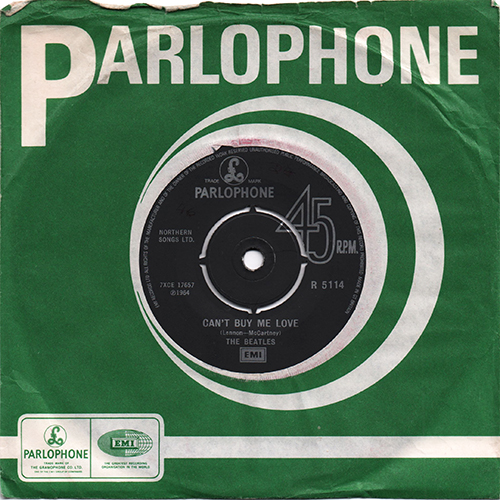 |
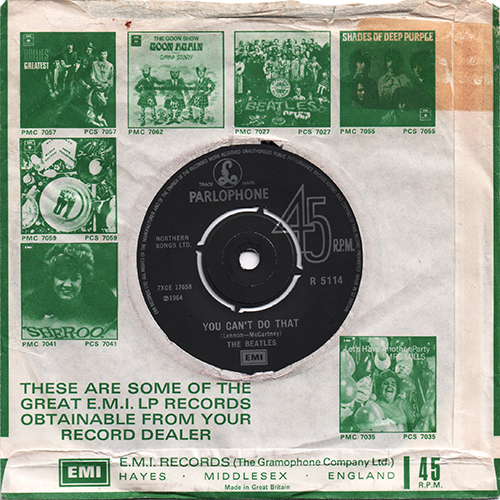 |
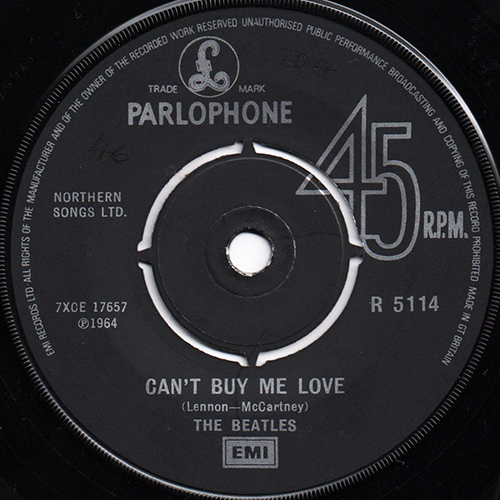 |
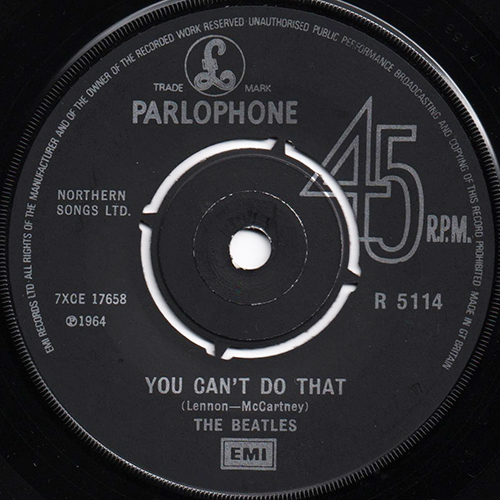 |
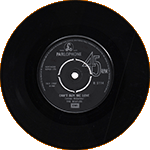 |
|
| LABEL CLOSE UP | |||||
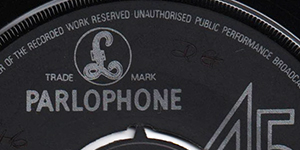 |
The Parlophone logo (small type) was
printed at the top of the label. |
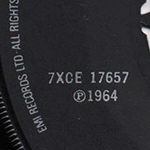 |
"EMI RECORDS LTD (capital letter)"
was printed at the perimeter. "Ⓟ 1964" statement was printed. |
||
| LABEL CLOSE UP | |||||
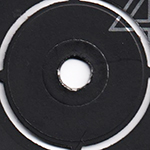 |
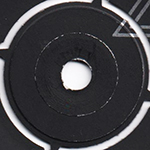 |
Push-out Center. With a knife edge. This variant has small polo ring to A side. |
|||
| LABEL CLOSE UP | |||||
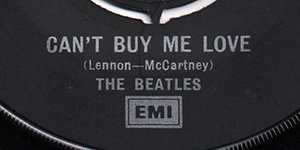 |
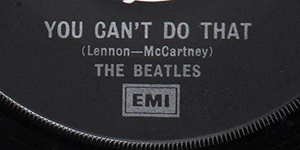 |
1975 Press? with both one box
EMI logo & Gramophone co. rim text |
|||
| LABEL CLOSE UP | |||||
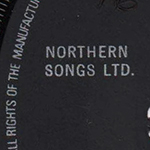 |
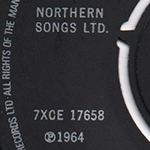 |
PUBLISHER'S CREDIT | SIDE 1 |
SIDE 2 |
|
| Has the "NORTHERN SONGS LTD. (2 lines)" credits on the label. |  |
 |
|||
| Matrix suffixed with "2" on both side. | |||||
|
OTHER ITEM
|
|||||
|
-
|
|||||
|
CATALOG NUMBER
|
R 5114 | ||||
|
LABEL
|
Silver Parlophone (One EMI box logo) | ||||
|
MIX
|
Mono | ||||
| MATRIX No. | SIDE 1 | 7XCE 17657 - 2
MOTHER & STAMPER 1 / M |
|||
| SIDE 2 | 7XCE 17658 - 2
MOTHER & STAMPER 1 / G |
||||
|
VINYL COLOR
|
BLACK | ||||
|
RECORD COMPANY'S
NAME
|
EMI RECORDS LTD (Capital letter) | ||||
|
CENTER
|
Push-out center with Polo ring | ||||
|
CENTRAL REMARK
"SOLD IN U.K..." |
YES | ||||
| RECORDING PUBLISHED CREDIT | Ⓟ 1964 |
||||
|
PUBLISHER'S NAME
|
SIDE 1
|
NORTHERN SONGS LTD. | |||
|
SIDE 2
|
NORTHERN SONGS LTD. |
||||
|
PRODUCER
|
George Martin | ||||
|
COVER DESIGN/
PHOTO/ NOTES
|
Green sleeve type-9B :
Tab cut at top. Glued bottom and right. "TRADE MARK OF THE GRAMOPHONE CO LTD." below the Parlophone logo on front. "EMI LPs" advert on back, issued in which advertised the latest EMI albums, including the Beatles own "SGT. Peppers". |
||||
|
COMMENTS
|
Special order, circa
1975. The Beatles' singles remained on catalogue throughout the Seventies. It is certainly possible that batches were pressed in 1975 to meet demand. There was still considerable demand for their work. This is also true of The Beatles' LPs, which are found on all label variations throughout the Seventies and bevond. The presence of polo rings coupled with the absence of the EMI box (/ Want To Hold Your Hand excepted) identifying the pressings circa 1972. In addition, we have seen those discs (predominantly) lacking polo rings along with knife edges circa 1974. The 1976 singles, the vast majority of them are push outs with polo rings. Matrix -2/-2 Very early stamper letters to both sides Side 1M Side 2 G This variant has small polo ring to A side. |
||||
